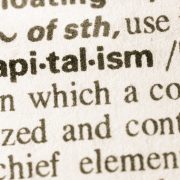Private corporations have become the punching bags of many, who are under the belief that socialism is needed to create a charitable society. In their minds, without government, human beings are not likely to give back. But by casting capitalists as the villain in every story, these critics neglect, or purposefully ignore, the many instances when private companies have given back to their communities. In fact, when national disasters strike, for example, it is often private organizations that arrive first on the scene.
Wild Fires
Of all the “greedy” capitalist entities, there is perhaps no one judged more harshly than oil companies. Yet, when a large forest fire consumed more than one million acres of land in the province of Alberta, Canada, the oil companies, along with other private entities, pulled together to lend a hand.
As it continued to burn for the better part of a month, the fire caused more than 60,000 residents to flee their homes. Many homes were destroyed and the city of Fort McMurray was left in ruins.
Commenting on the fire, Tristin Hopper of the National Post highlights specific relief efforts sponsored by local oil companies in Alberta. Hopper mentions how local oil companies provided free food and shelter to over 25,000 community members affected by the fires. Likewise, as the fires continued to spread and began cutting off easy access to the roads, Brion Energy arranged to have perishable foods delivered each day via truck shipments.
But the acts of charity were not limited to these oil companies alone. Shell Albian Aerodrome actually helped many residents escape the scene by providing buses for their evacuation. Suncor’s Firebag Aerodrome, also helped with the evacuation efforts by using its own company-chartered commercial jets to help over 7,000 residents escape the fire. But this is far from the only instance of private entities giving back.
Walmart Gives Back
Touching on the charitable acts of private entities in the Wall Street Journal, economics professor Steve Horwitz writes:
“That shouldn’t surprise anyone who knows what Walmart did after Hurricane Katrina hit the Gulf Coast in 2005. The company shipped thousands of trucks of water and other supplies into the area, well ahead of the lethargic Federal Emergency Management Agency. It even beat the Red Cross in many areas.”
In addition to the Walmart’s charitable acts, McDonald’s also handed out free food to first responders and Marriott offered up free rooms for those who had been displaced.
Though these private corporations are so often thought to be cold, unsympathetic, and disconnected from the experience of the typical American, they are, in fact, still members of their respective communities who rely on the patronage of the locals.
In return, these private entities are there to meet the needs of the consumer, which, under these circumstances, has meant giving the community what it needed most, acts of charity. In addition to serving their communities when it is most needed, the private sector offers something that the government has never been able to master; efficiency.
Driving this point home, Horwitz writes:
“These firms have experience that makes them distinctly effective during and after disasters. Walmart constantly responds to changing market conditions, moving people and resources where they are needed. FEMA and other agencies don’t regularly engage in this sort of behavior.”
Before casting stones at private corporations based solely on their desire to make a profit, it would be wise to first look at what these companies have done for their surrounding communities. Additionally, before praising the government for simply creating agencies meant to aid those in need, it would be wise to take a close look at how these agencies are run and ask ourselves if what is being done by government cannot be performed more adequately by the free market.













